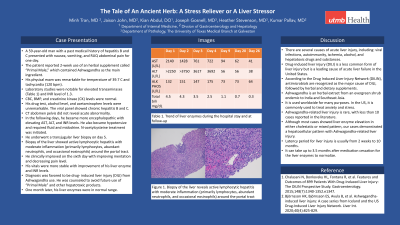Back


Poster Session C - Monday Afternoon
Category: Liver
C0544 - The Tale of an Ancient Herb: A Stress Reliever or a Liver Stressor
Monday, October 24, 2022
3:00 PM – 5:00 PM ET
Location: Crown Ballroom

Has Audio
- MT
Minh Tran, MD
UTMB
Galveston, TX
Presenting Author(s)
Minh Tran, MD1, Jaison John, MD2, Kian Abdul-Baki, DO1, Kumar Pallav, MD1
1UTMB, Galveston, TX; 2University of Texas Medical Branch, Galveston, TX
Introduction: Ashwagandha is found in several herbal products today. However, there is a paucity of literature regarding its safety. Our case serves to remind physicians about the potential liver toxicity of Ashwagandha and to illustrate how early recognition of drug-induced liver injury (DILI) and discontinuation of the offending substance can be lifesaving.
Case Description/Methods: A 58-year-old man with a remote history of hepatitis B and C presented with nausea, vomiting, and right upper quadrant abdominal pain of one day duration. He reported using an herbal supplement called “Primal Male,” which contained Ashwagandha as a main ingredient, over the past two weeks. He was normotensive, tachycardic up to 120 beats per minute (bpm), and febrile. The initial laboratory studies were notable for elevated AST level of 954 U/L, ALT level of 860 U/L, and a normal alkaline phosphatase level of 101 U/L. He had a normal total bilirubin level and an international normalized ratio of 1.3. His complete blood count and renal function were unremarkable. His creatinine kinase (CK) level was also within the normal range. His drug test, alcohol level, and acetaminophen level were unremarkable. The viral panel did not suggest active viral infections. His autoimmune panel was negative. An abdominal CT scan did not reveal any acute abnormality. In the following days, his symptoms worsened, and he became more encephalopathic. His AST, ALT, total bilirubin, and INR levels continued to rise. He developed hypotension and received intravenous fluids and midodrine. He also completed a course of N-acetylcysteine treatment. On the fifth day of admission, he underwent a transjugular liver biopsy. Liver histology showed active lymphocytic hepatitis with moderate inflammation (primarily lymphocytes, abundant neutrophils, and occasionally eosinophils) around the portal tract. On the sixth day of hospitalization, he reported decreasing pain and was more hemodynamically stable. His liver enzymes also showed improvement. The cause of acute liver injury was suspected to be drug-induced liver injury from Ashwagandha use. He was counseled to avoid the use of the herbal supplement and other hepatotoxic products. One month later, his liver enzymes were in normal range.
Discussion: DILI is a less common form of liver injury but is a leading cause of acute liver failure in the United States. Ashwagandha has been reported in a few cases of DILI. It is important to have an early suspicion of the offending agent and avoid further substance exposure.
Disclosures:
Minh Tran, MD1, Jaison John, MD2, Kian Abdul-Baki, DO1, Kumar Pallav, MD1. C0544 - The Tale of an Ancient Herb: A Stress Reliever or a Liver Stressor, ACG 2022 Annual Scientific Meeting Abstracts. Charlotte, NC: American College of Gastroenterology.
1UTMB, Galveston, TX; 2University of Texas Medical Branch, Galveston, TX
Introduction: Ashwagandha is found in several herbal products today. However, there is a paucity of literature regarding its safety. Our case serves to remind physicians about the potential liver toxicity of Ashwagandha and to illustrate how early recognition of drug-induced liver injury (DILI) and discontinuation of the offending substance can be lifesaving.
Case Description/Methods: A 58-year-old man with a remote history of hepatitis B and C presented with nausea, vomiting, and right upper quadrant abdominal pain of one day duration. He reported using an herbal supplement called “Primal Male,” which contained Ashwagandha as a main ingredient, over the past two weeks. He was normotensive, tachycardic up to 120 beats per minute (bpm), and febrile. The initial laboratory studies were notable for elevated AST level of 954 U/L, ALT level of 860 U/L, and a normal alkaline phosphatase level of 101 U/L. He had a normal total bilirubin level and an international normalized ratio of 1.3. His complete blood count and renal function were unremarkable. His creatinine kinase (CK) level was also within the normal range. His drug test, alcohol level, and acetaminophen level were unremarkable. The viral panel did not suggest active viral infections. His autoimmune panel was negative. An abdominal CT scan did not reveal any acute abnormality. In the following days, his symptoms worsened, and he became more encephalopathic. His AST, ALT, total bilirubin, and INR levels continued to rise. He developed hypotension and received intravenous fluids and midodrine. He also completed a course of N-acetylcysteine treatment. On the fifth day of admission, he underwent a transjugular liver biopsy. Liver histology showed active lymphocytic hepatitis with moderate inflammation (primarily lymphocytes, abundant neutrophils, and occasionally eosinophils) around the portal tract. On the sixth day of hospitalization, he reported decreasing pain and was more hemodynamically stable. His liver enzymes also showed improvement. The cause of acute liver injury was suspected to be drug-induced liver injury from Ashwagandha use. He was counseled to avoid the use of the herbal supplement and other hepatotoxic products. One month later, his liver enzymes were in normal range.
Discussion: DILI is a less common form of liver injury but is a leading cause of acute liver failure in the United States. Ashwagandha has been reported in a few cases of DILI. It is important to have an early suspicion of the offending agent and avoid further substance exposure.
Disclosures:
Minh Tran indicated no relevant financial relationships.
Jaison John indicated no relevant financial relationships.
Kian Abdul-Baki indicated no relevant financial relationships.
Kumar Pallav indicated no relevant financial relationships.
Minh Tran, MD1, Jaison John, MD2, Kian Abdul-Baki, DO1, Kumar Pallav, MD1. C0544 - The Tale of an Ancient Herb: A Stress Reliever or a Liver Stressor, ACG 2022 Annual Scientific Meeting Abstracts. Charlotte, NC: American College of Gastroenterology.
